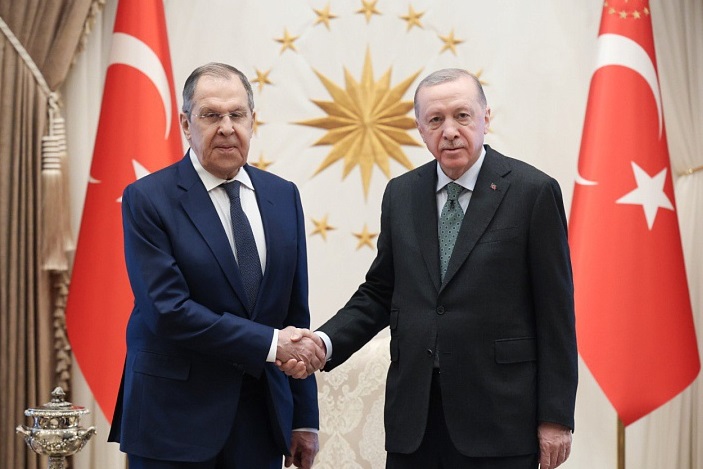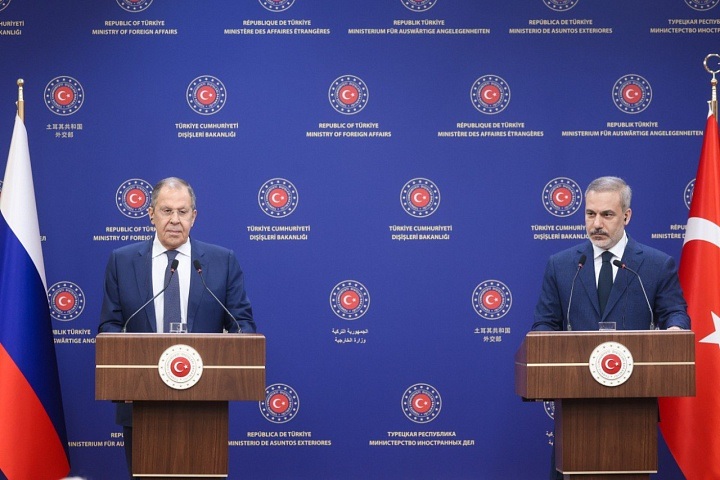 Foreign Minister Sergey Lavrov was received by President of the Republic of Turkiye Recep Tayyip Erdogan.
Foreign Minister Sergey Lavrov was received by President of the Republic of Turkiye Recep Tayyip Erdogan.
Photo: MFA
Press release on Foreign Minister Sergey Lavrov’s visit to the Republic of Turkiye:
On February 24, Foreign Minister Sergey Lavrov was on a visit to Ankara, where he was received by President of the Republic of Turkiye Recep Tayyip Erdogan and had talks with Foreign Minister of Turkiye Hakan Fidan.
During the meetings and conversations, the parties reaffirmed Russia and Turkiye’s commitment to implementing the agreements that were achieved earlier at the highest level, and to consistently develop the entire scope of mutually beneficial wide-ranging cooperation.
The sides also had a substantive review of current issues on the international agenda, with a special focus on the issues of Syrian settlement and the developments in the zone of the Palestinian-Israeli conflict.
They agreed to maintain extensive Russian-Turkish political dialogue, including on the Ukraine crisis as well as other international topics of mutual interest.
 Foreign Minister Sergey Lavrov at a joint news conference with Foreign Minister of the Republic of Türkiye Hakan Fidan.
Foreign Minister Sergey Lavrov at a joint news conference with Foreign Minister of the Republic of Türkiye Hakan Fidan.
Photo: MFA
Foreign Minister Sergey Lavrov’s statement and answers to media questions at a joint news conference with Foreign Minister of the Republic of Türkiye Hakan Fidan, Ankara, February 24, 2025.
“Media members,
On behalf of our delegation, I would like to express my heartfelt gratitude to Foreign Minister of the Republic of Türkiye Hakan Fidan for setting up, on a short notice, this meeting to discuss a wide range of bilateral and international issues. I would like to thank my colleague and friend for the traditionally gracious hospitality and the high level of organisation of the working visit of the Russian delegation.
We have noted with satisfaction that despite international tensions, the Russian-Turkish political dialogue has remained strong and shows progressive dynamics at all levels. President Putin and President Erdogan maintain regular communication. In addition to telephone calls, our leaders held two in-person meetings in 2024: one on July 3, 2024 on the sidelines of the SCO Heads of State Council meeting in Astana, and the other on October 23, 2024 during the BRICS summit in Kazan.
The pace of effective communication set by the heads of state is sustained by the foreign ministry officials, defence ministries, and intelligence services of the two countries. In 2024, Mr Fidan and I regularly exchanged insights on bilateral and international priorities. We met last time just a few days ago in Johannesburg on the sidelines of the G20 Ministerial Council.
We welcome the increased frequency of inter-parliamentary exchanges. On September 24-25, 2024, Türkiye’s Grand National Assembly Speaker Numan Kurtulmus paid an official visit to Moscow and was welcomed by President Vladimir Putin. He also held talks with the senior officials from the Federal Assembly of the Russian Federation and delivered a speech at the Foreign Ministry’s Diplomatic Academy. This week (on February 26-27), Federation Council Speaker Valentina Matviyenko will pay an official visit to Ankara.
We discussed ways to expand bilateral trade and economic ties, including our extensive energy cooperation. We noted mutual interest and promising potential for cooperation in the financial and banking sector, transport and logistics, and industrial cooperation, as well as tourism.
Of course, we discussed in detail various aspects of joint work on the construction of Akkuyu NPP which is a strategic project. Russian and Turkish specialists work hard as a team to ensure the physical start-up of Power Plant 1. All four power plants are being built concurrently literally round-the-clock. There is serious potential for starting even more projects in this sphere.
We also covered safe operation of the TurkStream and Blue Stream gas pipelines which is important amid unending provocations by the Kiev regime, which seeks to use terrorist acts to undermine steady functioning of energy facilities, including pipelines. It is important that they operate without glitches. Türkiye is a major importer and transit hub of Russian natural gas, and any destabilisation of energy flows for whatever reason will not only weaken the Turkish gas industry, but also exacerbate inflation in the energy market as a whole, which will ultimately affect the ordinary consumer.
We informed our Turkish friends in detail about the Russia-US talks in Riyadh on February 18, which were quite positive since they provided opportunities to normalise the dialogue, despite numerous differences that are still there. However, without this dialogue, it’s unclear whether we will be able to iron out these differences. We will continue contacts with our US partners, as agreed.
We have reviewed in detail a number of international and regional issues, including the processes related to the situation in Ukraine. We stick to our position. We note with satisfaction that there is much more realism now in the position of many countries, which realise that it will be impossible to agree on anything without a lasting and durable agreement that would eliminate the root causes of this situation.
We conducted a thorough analysis of the situation in the Palestinian-Israeli conflict zone, and exchanged views on measures that need to be taken to ensure an immediate and sustainable ceasefire, to release hostages, and to resume the negotiating process based on UN Security Council resolutions, which focuses on the right of the Palestinian people to establish an independent state, which would coexist with Israel side by side in peace and security.
We expressed satisfaction with the level of Russia-Türkiye interaction on Syria and reaffirmed mutual interest in stepping up joint efforts to achieve settlement based on new realities.
We reviewed prospects for deepening cooperation in the South Caucasus, and placed emphasis on building confidence between the parties, rebuilding infrastructure and transport links, and stepping up economic activity, including on the basis of multilateral agreements signed as part of the 3+3 Regional Cooperation Platform (the three countries from the South Caucasus and their three neighbours Russia, Türkiye, and Iran).
I believe that this contact was useful overall. We will continue to work in Ankara. I feel confident that this meeting will contribute significantly to continued development of the multifaceted cooperation between the Russian Federation and the Republic of Türkiye.”
Question: There have been some interactions between Russia and the United States. Can they somehow contribute to the process? And, in view of Turkiye’s mediating role, could it host or offer a venue for the talks? On the other hand, Mr Zelensky spoke about international security and security guarantees. What do you think about this? He also mentioned that both Turkiye and European countries should engage in the efforts. What do you think about this process, Mr Minister?
Sergey Lavrov: I can only reaffirm our stance. It has not changed, unlike the position of the character you mentioned; he changes it more often than his green t-shirts. The position of the European countries is also hardly comprehensible because it is fairly unstable and changes whenever someone gets certain “ideas.”
The position of the United States stands out in this context. It has been stated consistently and does not call for an immediate reconciliation, preserving the line of contact with subsequent thinking about what is to be done. We have always emphasised that this option would not suit us.
We already tried this option in April 2022, when we reached an agreement in Istanbul based on the principles that the Ukrainians proposed to us. They made a request, asking us to stop the advance of our troops as a gesture of goodwill and even pull back, and we did so. The sole outcome was that the West, acting through then British Prime Minister Boris Johnson, forbade Ukraine to sign the document it had initiated, claiming that Ukraine should continue the efforts to further weaken Russia, and would receive arms, conduct mobilisation and fight until Russia suffered a “strategic defeat” on the battlefield.
This is why we no longer accept options involving the use of some pieces of advice from the “other” side. Russian President Vladimir Putin has clearly stated that we are ready to talk with Ukraine, Europe and any representatives who, in a spirit of goodwill, would like to help achieve peace. But we will stop hostilities only when these negotiations produce a solid and sustainable result that suits Russia. Obviously, the realities on the ground must be taken into account, given that since 2019 the Nazi regime in Kiev has adopted a set of laws banning the Russian language in all spheres of life – education at all levels, the media, and culture.
Recently this very regime legislated a ban on the canonical Ukrainian Orthodox Church. This prompted the residents not only of Crimea (who made their choice back in 2014 in the face of the Nazi coup in Kiev), but also those of Donetsk, Lugansk, Kherson, and Zaporozhye regions, to make their own choice. They refused to remain under the rule of a regime that was exterminating everything Russian on the lands that had been developed by Russians for centuries, with cities built and factories, plants and ports constructed there.
They have made their choice in accordance with the Russian Constitution; this choice has acquired international legal status. Respect for all these realities is imperative, as is categorical non-admission of Ukraine to NATO. We want a clear, ironclad agreement on this matter.
At the meeting with our American colleagues in Riyadh, we welcomed the fact that US President Trump had publicly and repeatedly called the policy of dragging Ukraine into NATO a mistake. He said that if he had been president in those years, he would never have allowed this policy to prevail – and thus, according to him, no crisis would have occurred.
But there is no denying that the efforts to drag of Ukraine into NATO are among key root causes of the current events. One of Donald Trump’s advisers said that the war was clearly provoked, and not necessarily by Russia. This war had been plotted for a long time by Washington under the Democrats, by Brussels, and by the Brussels bureaucracy.
The second root cause is the genocide of all Russians and Russian-speaking residents in southeastern Ukraine, those who made their legitimate choice to reunite with Russia.
As regards security guarantees, here in Istanbul, in April 2022, they were discussed on behalf of the five permanent members of the Security Council, as well as on behalf of Turkiye and Germany, but on the condition that Ukraine would not join NATO. There was a detailed outline of what this should look like.
There were security guarantees on the table that were formulated by the Ukrainian delegation: a non-aligned policy without joining any military alliances. The West forbade it. So now we have to consider who will ultimately solve this matter. I do not think that the Ukrainian leadership is capable of doing anything other than seeking to make money, including in “bargaining” with the United States on how to pay for the aid that the Biden administration pumped into Ukraine without any justifying documents.
read more in our Telegram-channel https://t.me/The_International_Affairs

 14:19 25.02.2025 •
14:19 25.02.2025 •






















